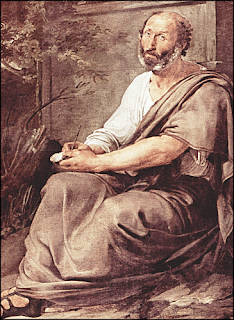Introduction
The study of aesthetics and creativity is a crucial aspect of philosophy as well as literatures, and it has been discussed by various philosophers, critics and rhetoricians throughout history. Three prominent philosophers who contributed significantly to the topic are Socrates (469-399bc), Plato (428?-347 bc), and Aristotle (384-322 bc). These philosophers had the guru-shiswa parampora but had differing views on aesthetics and creativity, which led to fundamental differences in their approaches. In this essay, we will explore these differences.
 |
| Socretes |
 |
| Plato |
On the other hand, Plato believed that beauty is an abstract concept that exists only in the mind. Plato's theory of Forms states that everything we see in the physical world is a mere imitation of an ideal Form. Plato says, "The true lover of knowledge naturally strives for truth, and is not content with common opinion, but soars with undimmed and unwearied passion till he grasps the essential nature of things." Plato believed that the Forms were perfect and that the physical world was a flawed imitation. He believed that artists could not create true beauty because they were only imitating the Forms.
Aristotle, on the other hand, had a more practical view of aesthetics and creativity. Aristotle believed that beauty was a combination of form and function. He believed that a beautiful object not only looked good but also served its purpose well. Aristotle believed that art was a form of imitation that could lead to a better understanding of the world. He also believed that creativity was an essential aspect of human nature and that it was necessary for personal growth and development.
In terms of creativity, Socrates believed that creativity was a form of divine inspiration. He believed that artists were not the creators of their works but were merely conduits for divine inspiration. Plato also believed that creativity was not a human invention but a divine gift. He believed that artists were only imitating the Forms and that true creativity could only be achieved by connecting with the divine. "The Republic" quotes the below conversation: And as to the painter, is he the creator or maker of something of this sort? Not at all. .... 'This,' he said, 'seems to me to be the most accurate thing to call him the imitator of that which others create.' 'Well then,' I said, 'would you call him one who produces an imitation which is three stages away from the real existence?' 'Yes, I would indeed,' he said.
 |
| Aristotle |
Aristotle had a more practical view of creativity. He believed that creativity was a natural human ability that could be developed through practice and learning. Aristotle believed that creativity was a necessary aspect of human nature and that it was essential for personal growth and development.
Conclusion
The principal differences between Socrates, Plato, and Aristotle in defining aesthetics and creativity are significant. While Socrates believed that beauty was inherent in things, Plato believed that beauty was an abstract concept that exists only in the mind. Aristotle, on the other hand, had a more practical view of aesthetics and believed that beauty was a combination of form and function. In terms of creativity, Socrates and Plato believed that creativity was a form of divine inspiration, while Aristotle believed that creativity was a natural human ability that could be developed through practice and learning. As students, it is essential to understand these differences and to develop our own perspective on aesthetics and creativity, based on our experiences and beliefs. We must strive to be creative and to appreciate the beauty in the world, while also understanding the moral and ethical implications of our actions.

Comments
Post a Comment
Drop any query, suggestion or comment here.